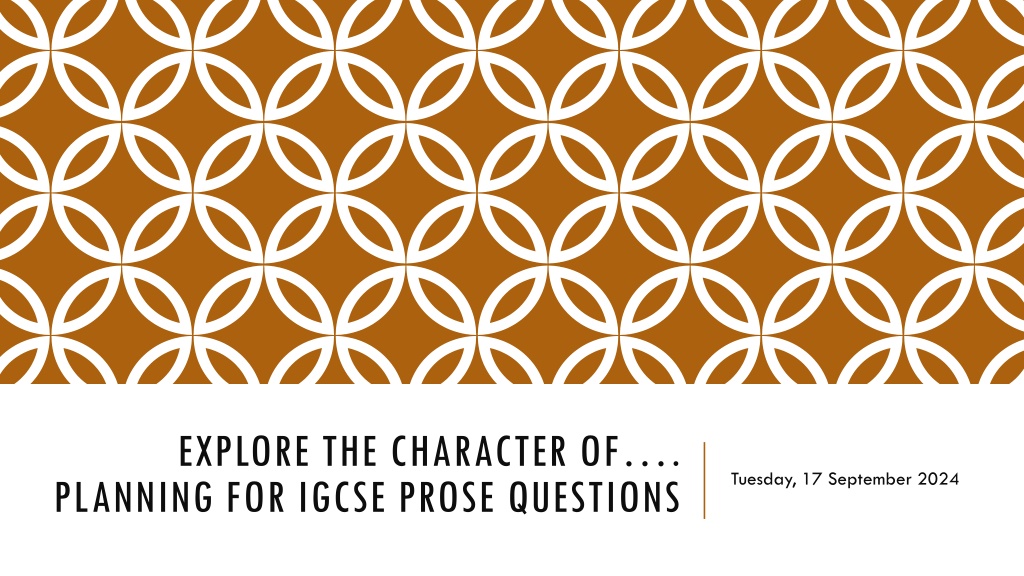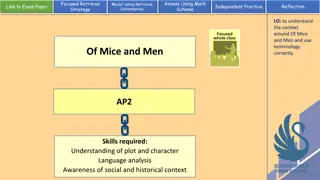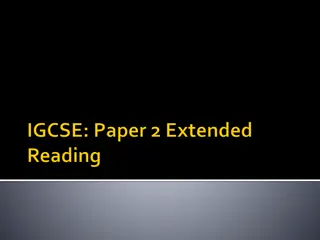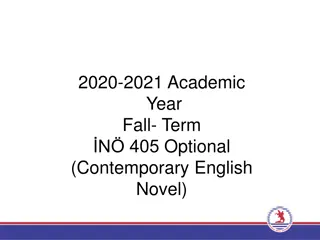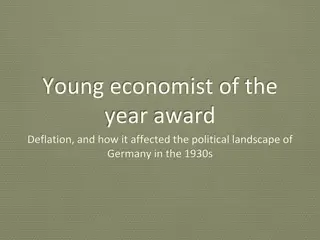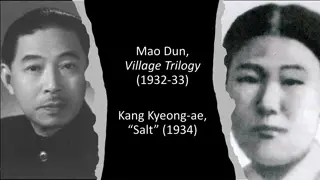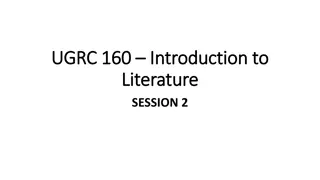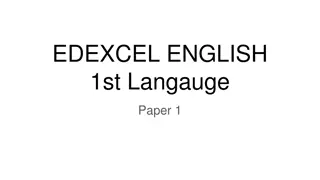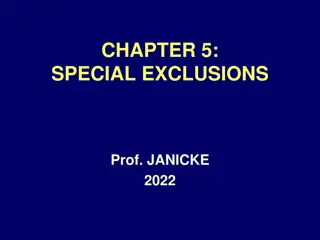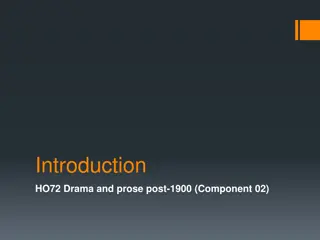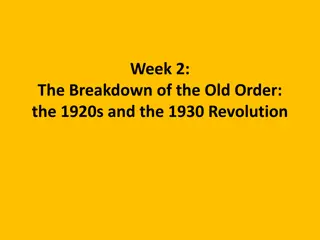Exploring the Character of George in 1930s America for IGCSE Prose
Steinbeck's portrayal of George in the context of 1930s America reflects themes of the post-depression and dustbowl era, societal collapse, the American Dream, discrimination, and the challenges faced by itinerant workers. George's character serves as a lens through which to examine the failures of the American Dream and the harsh realities of a society in turmoil.
Uploaded on Sep 17, 2024 | 0 Views
Download Presentation

Please find below an Image/Link to download the presentation.
The content on the website is provided AS IS for your information and personal use only. It may not be sold, licensed, or shared on other websites without obtaining consent from the author. Download presentation by click this link. If you encounter any issues during the download, it is possible that the publisher has removed the file from their server.
E N D
Presentation Transcript
EXPLORE THE CHARACTER OF. PLANNING FOR IGCSE PROSE QUESTIONS Tuesday, 17 September 2024
WHAT DO WE NEED TO SHOW? It is clear that both threads must be hit in order to achieve a good mark. Contexts may be historical and also literary they must not be simply bolted on like a short history lesson in the middle of a literature essay.
BEGIN TO PLAN You have around 50 minutes for this question in the examination use at least 10 minutes of this time to think and plan. Let s focus: Explore the character of George in OMAM
CONTEXTS Foreground your thinking in this area to be sure of hitting it. 1930s USA: Post depression and dustbowl Society is collapsing in California as migrants arrive expecting a promised land Escapism is provided by Hollywood The term American Dream is coined in 1931 by John Truslow Adams: that dream of a land in which life should be better and richer and fuller for everyone, with opportunity for each according to ability or achievement. It is generally seen to have failed. Itinerant workers travel the land selfish and rootless and with no societal safety net Steinbeck worked as one such traveller before writing this book The book is part of a trilogy written to explore the failed American Dream and the impending collapse of society. (In Dubious Battle and Grapes of Wrath are the other two) A masculine society based on the American Cowboy/frontier stereotype is seen Discrimination is rife and increased by the Darwinian aspects of an every man for himself society.
CHOOSE FROM THESE AND MAKE THEM RELEVANT TO GEORGE 1930s USA: Post depression and dustbowl. Society is collapsing in California as migrants arrive expecting a promised land The term American Dream is coined in 1931 by John Truslow Adams: that dream of a land in which life should be better and richer and fuller for everyone, with opportunity for each according to ability or achievement. It is generally seen to have failed. Itinerant workers travel the land selfish and rootless and with no societal safety net. Steinbeck worked as one such traveller before writing this book Discrimination is rife and increased by the Darwinian aspects of an every man for himself society.
NOW YOU HAVE 4 SECTIONS TO THE ESSAY, WHICH MUST FOCUS ON GEORGE Steinbeck uses the character of his protagonist, George Milton, to explore the key themes at the heart of this critique of late 1930s America 1930s USA: Post depression and dustbowl. Society is collapsing in California as migrants arrive expecting a promised land George leads Lennie from place to place seeking work. Authority in the hands of the powerful even bus drivers have power over these men George represents a different type of authority kind and considerate with Lennie (Paternal not patriarchal?) But not us Isolation makes men mean George on p46. George and Slim offer a recipe to repair a broken society at the end.
THE TERM AMERICAN DREAM IS COINED IN 1931 BY JOHN TRUSLOW ADAMS: THAT DREAM OF A LAND IN WHICH LIFE SHOULD BE BETTER AND RICHER AND FULLER FOR EVERYONE, WITH OPPORTUNITY FOR EACH ACCORDING TO ABILITY OR ACHIEVEMENT. IT IS GENERALLY SEEN TO HAVE FAILED. The novel is full of dreams. Intertextuality of the title shows that no dream can come true. George MILTON writer of Paradise LOST. Live of the fatta the lan , The men seek self sufficiency, not wealth or power. This is the old form of the dream, not the debased version of the 1920s. The dream in part 1 is a bedtime story it calms Lennie. As the novel continues, George s scepticism is eroded by Candy s money. He can be seen as embodying the true spirit of the frontier strong, quiet, honest, hospitable, able to cope with hardship Even in the late 1930s the dream can be seen to win men over
ITINERANT WORKERS TRAVEL THE LAND SELFISH AND ROOTLESS AND WITH NO SOCIETAL SAFETY NET. STEINBECK WORKED AS ONE SUCH TRAVELLER BEFORE WRITING THIS BOOK Steinbeck knew the loneliness, hardship and discrimination which befell such men. There is a fragility all depends on a fair boss and the seasons this is autumn: work is about to dry up. guys that work on ranches are the loneliest guys in the world George can see the reality and acknowledge how he and Lennie are different. George tries to maintain standards hygiene in the bunk house. George potentially stifles his own success by looking after Lennie he seeks company because he knows isolation makes men mean His awareness of this will lead him to kill Lennie to protect his friend form the cruelty of a harsher society.
DISCRIMINATION IS RIFE AND INCREASED BY THE DARWINIAN ASPECTS OF AN EVERY MAN FOR HIMSELF SOCIETY. At the end this is clear: George and Slim leave as a pair sharing the pain. Carlson and Curley clearly do not understand what the hell ya suppose is eatin those guys . Steinbeck presents a choice between selfishness and sharing. George is a figure of honest integrity. His hostile response to CW is based on his fear for Lennie s behaviour, not the same bigotry as shown by the others (especially Candy). He is anxious about Lennie being in Crooks room he does not actually use the N word in the text, apart from his first repetition of Candy s words. There is no clear emotion attached. He knows he has to protect Lennie to the end and asks for and receives help from Candy. He gathers men around him, as does Slim. He is private he fears that telling the dream will cause trouble theft? Jealousy? He and Slim discuss society in Part 3 the centre of the text an apt position for such a discussion which lies at the heart of Steinbeck s philosophy.
THE ESSAY There s enough here for an essay Each theme begins in the context and is made relevant to the title of the essay George must be foregrounded, so do not become sidetracked and end up writing paragraphs about Lennie or Curley s Wife. Instead, allow yourself a couple of sentences to help you to show thorough knowledge of the text.
SAMPLE PARAGRAPHS In 1931, when John Adams coined the term American Dream he was pointing out the failure of an ideal in which each man would become self-sufficient by means of hard work and honest integrity. Steinbeck uses George to explore this idea by showing the awakening awareness of the possibility of achieving the dream, whilst showing by the intertextuality of Burns poem and by George s surname Milton suggesting the writer of Paradise Lost, the futility of such dreams. At first George is clearly sceptical as he reluctantly tells Lennie the Dream-story around the fire in part 1, almost as father soothes an infant with a bedtime story. It is clear that this is a regular occurrence, both from George s reluctance to repeat the tale and Lennie s memorisation of the key elements of the story, ending in the idea of live of the fatta the lan which lay at the heart of the dream of all pioneers and settlers who had moved west across America from the early 17th century. George is intelligent to know that the dream cannot succeed and is reluctant to share the dream with anyone until Candy eavesdrops on a conversation and overcomes George s hostility with his offer of money. George s new excitement we ll do her suggests that the pioneer spirit is lying deep in the psyche of all Americans. However, once the dream is attainable, George is doomed to fail. The events which follow lie outside his control, but he is swift to realise that all is lost when he sees Curley s Wife dead in the barn. He is silent as Candy asks about the farm before responding : I think I knowed from the very first He recognises that the Dream cannot evercome true, let alone in such punishing times as 1937 America. George is not only used to represent the failure of the American Dream, but also to shed light onto the true nature of life for the displaced itinerant workers who crossed the continent in search of work in post-Crash America. Steinbeck knew such men well, having shared their situation, and he presents George as struggling to remain rooted to society, in a world of individuals (this is a Janus link)
